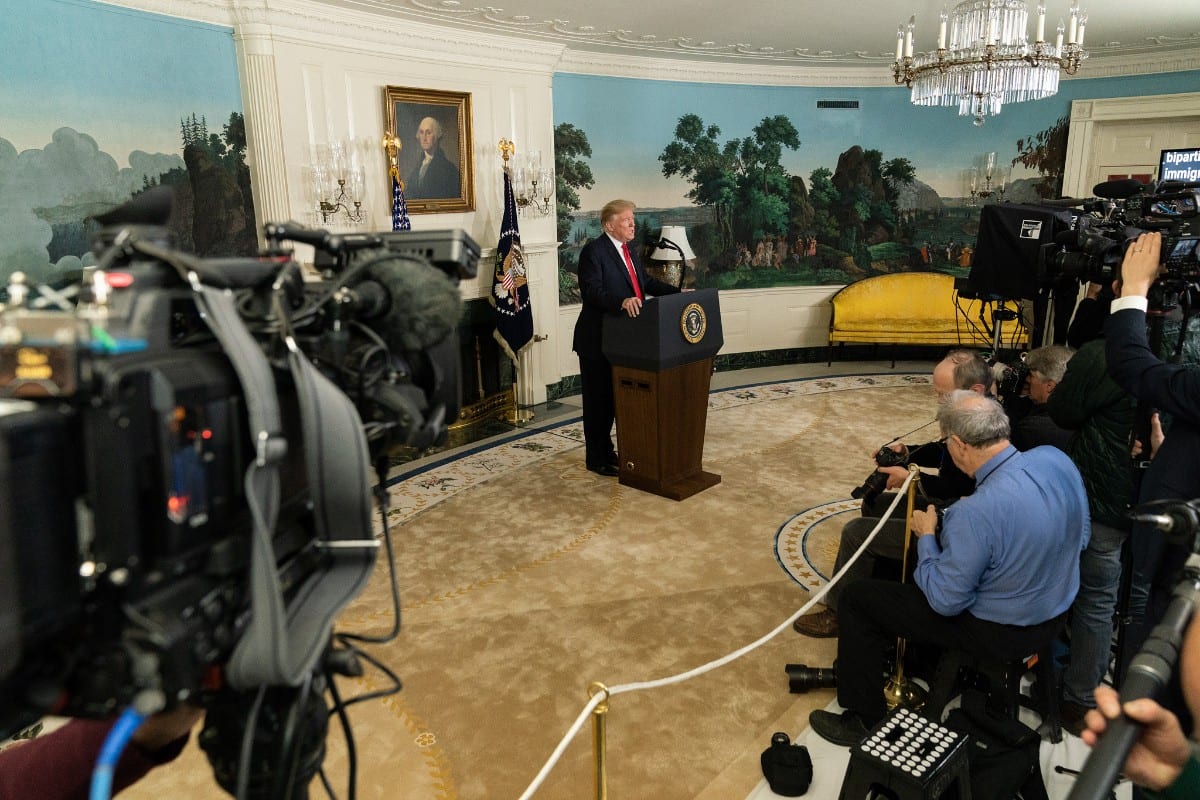 President Trump speaking about the southern border. White House photo.
President Trump speaking about the southern border. White House photo.
Government Shutdowns Weaken America’s Message Abroad
American public diplomacy has long operated from the premise that America has an attractive story to tell. It contends that the American story is inspirational—that others should either follow in the American image or use its lessons to guide their own paths forward. And despite the warts that the American story has, from slavery to expansionism, the history of America presents a case of the struggle for continuous improvement. It’s a story worth knowing, and a story that carries weight. The idea of America is one worth spreading, but the reality of it is that it’s an ongoing project which takes constant care and vigilance.
With the U.S. Government shutdown having lasted 35 days before coming to what may only be a temporary reprieve, it’s becoming less and less clear that the American story is one that will continue to inspire, particularly if shutdowns become a matter of routine. The very premise of the shutdown itself created an unfortunate message: the most powerful nation on earth is unable to run its own government because the political parties disagree on whether to build a wall.
That’s not a winning narrative. The story that is unintentionally being told now is that the American system of government no longer works. It’s dysfunctional, unable to govern, unable to pay its own workers, and rendered ineffective on account of partisan gridlock. Yesterday on CNN, former White House Director of Communications Anthony Scaramucci acknowledged the absurdity, saying, “It also sends a message to the world. What are you guys doing? Okay, I mean you can’t get it together to keep the government open? I mean, it’s just silly.” And silly it definitely is.
A public diplomacy officer, charged with building relationships with foreign publics, might explain the shut down this way: The Founding Fathers intended a certain degree of inefficiency in the way the Constitution was written. The framework of the US Government was designed to prevent tyranny of the majority. This genius-level design is a key part of the American story. It enshrines the rights of both the majority and the minority in a way that allows for legitimate political opposition. There are valuable lessons in this approach for others around the world to consider. The inefficiency inherent in the government was by design, making it intentionally difficult to get things done, and therefore harder to oppress minorities or intentionally break the system.
However, the system and the norms it encourages are now being intentionally broken. The skill of a public diplomacy officer to explain the American system of government may no longer be enough, especially when counter narratives from adversaries are so easily accessible. We’ve now reached a point where the level of inefficiency in our government is harming the average American. Individuals and small minorities have effectively taken advantage of the system in order to prevent the government from functioning at all. This tyranny of the minority is a difficult story to sell. Why would a foreign citizen find value in the American way?
We must scrutinize our story telling alongside foreign policy objectives, otherwise we won’t come off as credible. We’ve spent nearly two decades trying to build democratic governance in far-away lands, using our expertise to advise and guide the development of functioning governments. We know this mission is difficult, but it looks ridiculous trying to improve governance in Afghanistan or Iraq when our own government couldn’t pay our Coast Guard, and that’s without the added challenge of fighting a war within our borders.
As the United States embarks on the journey that will be 2019, it is incumbent upon us as stewards of our country’s legacy to ensure the story we want to tell abroad matches what we do at home. If we want to be an example beyond our borders, we must do our best to be an example within our borders. That means governing, reaching across the aisle, being willing to compromise and work in a bipartisan fashion—lest we look absurd to those we are trying to influence abroad. Our own ability to do this, by learning to work together, will serve as a better model for public diplomacy purposes than our ability to grind it to a halt. This is not about the wall, but rather making sure that the debate over a wall or anything else doesn’t prevent the government from operating. Our national leadership must be more responsible, and create contingency plans that prevent any single party, or any single individual, from shutting down the government on account of partisanship.





